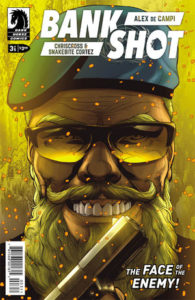 Bank Shot #3
Bank Shot #3
Publisher: Dark Horse Comics
Writer: Alex de Campi
Artist: ChrisCross
Colorist: Snakebite Cortez
Letterer: Alex De Campi
Cover: ChrisCross and Snakebite Cortez
Two issues further down the rabbit hole that is Alex De Campi’s BankShot, and much of the criticism from my first review still rings true. Don’t get me wrong, the series is lean and brutish, with an unapologetic ardor for vengeful bloodletting. I simply find myself longing for a bit more subtlety and subtext. The more we learn about protagonist, Marcus King, the stronger the desire to see him motivated by factors beyond revenge and material acquisition. Deepening that motivation would really boost the catharsis of a positive resolution by drawing more investment in and attachment to his success, or by drastically escalating our horror at his failure for the same reason. He is a regrettably anemic cut-out who doesn’t elicit much in the way of empathy.
As far as De Campi’s writing is concerned, stilted one liners pepper the action sequences, which are frequent and chaotic. The perfunctory dialogue offers little in the way of introspection or subtlety. The frenzied action is at times imprecise, but the effect is not so distracting as in the first issue; unlike the contrived, intrusive flashbacks. The telling would have been far better served by fewer of these chronological abruptions, but the creative team seems hellbent on wrenching reader back and forth arbitrarily. After the first issue I had been hoping for an examination of King’s history with the malevolent Agent Gault, who had been surreptitiously plotting his destruction. The second issue delivered on that expectation grudgingly, through hasty exposition posed more as a formulaic requisite than cohesive plot development. Allusion in the first issue to a broad conspiracy implicating the US government in manipulation of African politics also hasn’t materialized into any thematic substance, but I guess one could say, “It’s been done.”
What is recurring and seemingly intrinsic, at least in part, to Marcus King’s validation as a protagonist, is an ambiguous racial subcurrent. He is the object of a presumed inferiority consistently perceived and perpetuated by both antagonists, FBI Agent Gault and mercenary warlord, The Dutchman. This really is a point of contention for my perspective on the project as a whole because the ambiguity I’m referring to isn’t whether the overt racism is reprehensible, but whether it has been artificially infused into the narrative to make the protagonist relatable. As previously stated, King is a hollow character. He is resilient by design, but we know nothing of his formative stages or any past adversity that would imbue his hardy caliber. Flashbacks that would lay that foundation play out concurrently with the present events in a way that finds King’s motivations conveniently discovered as they become relevant. Told in this manner the reader cannot form any expectations or bank on any intimacy with the character. I would hate to think, rather than having the racial element serve to affirm his upstanding quality as a protagonist , that it instead has been devised to arouse a sense of solidarity or even sympathy. At this point I cannot tell and I don’t like it.
Christian Davenport

